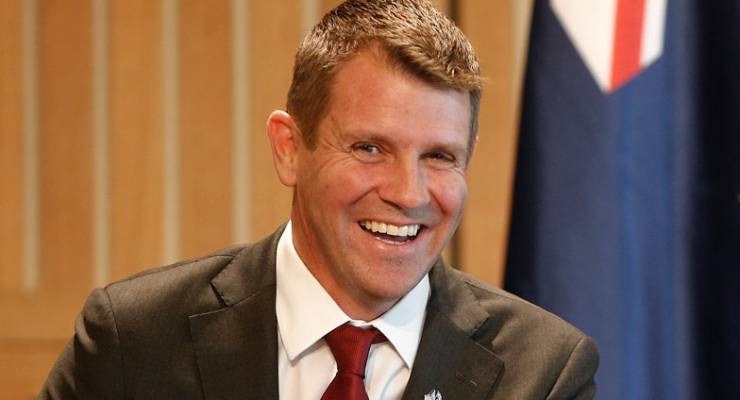
After securing a windfall $16.189 billion from the sale of 51% of Ausgrid, the state’s major power distributor, NSW Premier Mike Baird is this week beating off developers and infrastructure specialists advising him how to spend it.
Following the earlier lease of Transgrid for $10.258 billion, the Baird government has accumulated mountainous revenue from “poles and wires” sell-offs.
When the sale of Endeavour Energy is completed early next year, a further $6 billion is likely to pour into Treasury coffers.
The NSW budget is in the very congenial position of having nil public debt and a triple-A rating. The success of the power sell-offs means that its coveted AAA credit rating is guaranteed until the next state election in March 2019, when it will provide the centrepiece of the Coalition’s re-election strategy.
By a happy coincidence, Lucy Turnbull, the chief commissioner of the Greater Sydney Commission, announced breathtaking plans to re-engineer and redesign Sydney on the eve of Ausgrid’s part-sale to AustralianSuper and IFM Investors.
[Keane: why do we let spooks dictate economic policy?]
Under Lucy Turnbull’s draft master plan, greater Sydney will be divided into three cities: the Eastern City (where Turnbull lives with her husband, Prime Minister Malcolm Turnbull), Central City, based on Parramatta, and Western City, centred on the second Sydney airport at Badgerys Creek.
“Three cities is a bold, new vision for Australia’s largest metropolitan area,” she said.
The Western City will include Camden, Campbelltown, Liverpool and Penrith, which “we call the String of Pearls,” she said, and Parramatta is slated to become the new home of NSW Parliament.
Turnbull’s Greater Sydney Commission, established by legislation nine months ago, enjoys the support of the Prime Minister (naturally), Premier Mike Baird and a small army of lobbyists from the construction, infrastructure and retail industries. They are now swarming the corridors of ministerial offices seeking appointments and pressing their pet projects.
In last week’s Bradfield Oration which unveiled her plans, Turnbull singled out Lend Lease, Frank Lowy’s Westfield shopping centre business and Macquarie Bank for highly favourable mention. They are “now global leaders in their fields”, she gushed, “and gone on to conquer the world. We must be so proud of that.”
She also unveiled GPOP — the Greater Parramatta to Olympic Park corridor — saying: “Not just a snappy name, GPOP is a shared vision for the growth of this area.”
Those who heard Turnbull’s speech told Crikey it was like “listening to a lecture by Lady Bountiful in Quaker Hall a century ago”.
[Malcolm and Lucy’s neighbourhood watch]
With Malcolm’s approval rating plummeting, there are serious doubts about the political wisdom of the Turnbull name being plastered all over an epic upheaval in the way Sydneysiders will live, work, shop and commute in two-and-a-half years’ time.
And will NSW Liberals really enjoy contesting greater Sydney’s 51 seats while facing a negative Labor campaign aimed at the arrogant insensitivity of the Baird-Turnbull names?
If the message from the Turnbulls, in Canberra and Sydney, continues to sound condescending and imperious, it just won’t fly.
NSW Arts Minister Troy Grant, the Deputy Premier and leader of the Nationals, delivered a pre-emptive strike against the lobbyists at the weekend when he announced a high-powered committee to report on ways to improve the way the NSW government supports and develops arts and culture.
At a stroke, Grant gave himself an alibi to proffer to delegations from the arts industry seeking hundreds of millions of dollars for their future projects.
He can now tell them with a straight face that his hands are tied until he receives the final report next year from corporate tsar David Gonski, financier and philanthropist Simon Mordant and Gretel Packer, sister of embattled casino owner James Packer.
Grant also gave notice that he will merge the functions of Arts NSW and Screen NSW to deliver improved “outcomes” for the arts industry.
Baird has been careful to avoid giving his “bucket list” of projects, but Crikey understands that roads and rail infrastructure will consume the bulk of spending allocated for greater Sydney. The top priority will be the Sydney Metro, a fast rail link between central Sydney and Parramatta.
A smaller proportion of the infrastructure budget will be spent on highways and rail links in regional and rural areas.
Hospitals and schools — which do not generate government revenue — will be given a lower priority unless they are built with private sector support.
The billions of dollars raised by the sale of “poles and wires” has been like tipping blood in the water, and the sharks are gathering. And the sharks don’t think electorally; they don’t care whether the Coalition or Labor are in power, they simply want to get their hands on the fabulous proceeds of the sale of publicly owned utilities.








How short sighted is it to sell the asset that allows government operational management of the transition from centralized to decentralized electricity generation? We step into the unknown, casting away our life line.
A while ago, I seem to recall that Malcolm promised that his ideal was to ensure that no-one in Sydney was more than 30 minutes from anywhere. Now his wife has achieved the promise by the simple expedient of divvying the city into 3 bits. Voila and Hey Presto!
Imperious and condescending, moi?
This vision leaves me cold. A city further divided between the few rich and the many disenfranchised and worse off. The inner west is being decimated by the westconnex, while most residents wanted better public transport. A tragic trajectory it looks like.
Ferdinand & Imelda Turnbull could be very bad news for Sydney.
The hewers of water & carriers of wood get to live a minimum of an hour commute from the places of servitude, just as in the Benighted States of Amerika.
Hark, is that the undead corpse of SerfChoices I hear breaking out of its grave?
I thought that it had been cremated.